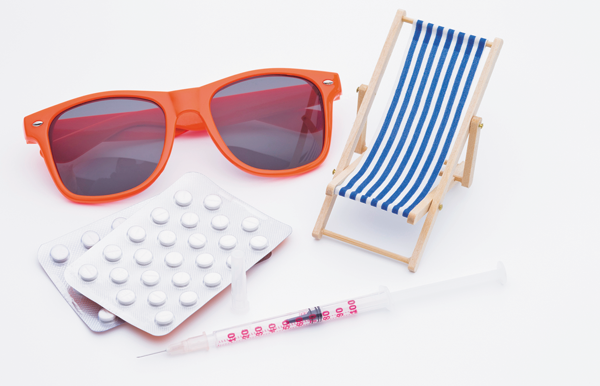
Image: Rallef/ThinkStock
When you think of a holiday, your medicine cabinet probably doesn't come to mind. But for people who take medications long-term, a drug holiday—a break from a medication for days or even years—may be helpful, for some medicines. "For some people, it gives the body a chance to recover the systems that have been suppressed by the drug," says Dr. Michael Craig Miller, assistant professor of psychiatry at Harvard Medical School.
Why take a break?
In some cases, medications have unwanted side effects, and taking a drug holiday offers some relief from them. For example, selective serotonin reuptake inhibitors (SSRIs) such as fluoxetine (Prozac) or sertraline (Zoloft) to treat depression may suppress the ability to feel desire or to have an orgasm. "One way to deal with that is to take the drug when you're less likely to have sex, maybe during the week, and to stop taking it on days you're more likely to have sex, such as the weekend," says Dr. Miller.
In other cases, a drug holiday may reduce a long-term risk associated with a medication—for example, the bisphosphonates used to treat osteoporosis. Holidays are sometimes prescribed after a person has taken an oral bisphosphonate such as alendronate (Fosamax) or ibandronate (Boniva) for five years, or has received three annual intravenous infusions of zolendronate (Reclast). Such drug holidays lower the risk of a rare type of fracture that can occur near the top of the femur (thighbone), as well as a rare type of damage to the jawbone (see "Easy ways to build better bones"). "We don't have a lot of data about when to restart bisphosphonates after a drug holiday, but you can take them if you need to at some point in future, as more of a booster, for a shorter length of time," says Dr. David Slovik, an endocrinologist at Harvard-affiliated Massachusetts General Hospital.
How to take a break
You must work with your doctor if you'd like to take a drug holiday. He or she will determine if you're a candidate for a break, and consider chronic health conditions you have and other medications you take. "Everybody's experience will be different," says Dr. Miller.
If your doctor says a drug holiday is not appropriate for your medication, but you feel the drug is not working or is causing unwanted side effects, ask about switching to another drug, how to do that safely, and whether a new medication would have potential side effects or long-term risks. Remember, too, that sometimes finding the right medication takes trial and error. Don't give up; stick with it, and stick to the rules for proper use.
Drug holidays: Don't try them on your own
In general, stopping a medication abruptly can be risky and even life-threatening. For example, if you suddenly quit taking a proton-pump inhibitor, such as lansoprazole (Prevacid) or omeprazole (Prilosec), used to reduce acid reflux and heartburn, you can suffer a rebound effect—a relapse marked by a surge of stomach acid. People with advanced Parkinson's disease who stop taking the often-prescribed drug combination of carbidopa and levodopa (Sinemet) may experience severe rigidity, fever, a change in consciousness, and even death. "In the 1980s, a drug holiday was thought to reduce the side effects of the medication by resetting the brain receptors. But the evidence does not show a difference in long-term improvement. We now know there can be severe complications from abruptly withdrawing.
I feel that drug holidays have no role in treating Parkinson's disease," says Dr. Albert Hung, a Parkinson's disease specialist at Harvard-affiliated Massachusetts General Hospital.
Other medications you must never stop on your own include those to treat high or low blood pressure, diabetes, high cholesterol, severe pain, anxiety, or insomnia.
What if you're experiencing side effects from your medication, or you feel it isn't working? "That's not time for a holiday, but it may be time to switch to another drug. But, with your doctor's advice, be sure to taper one while starting another," says Dr. Michael Craig Miller, assistant professor of psychiatry at Harvard Medical School.
|
No comments:
Post a Comment